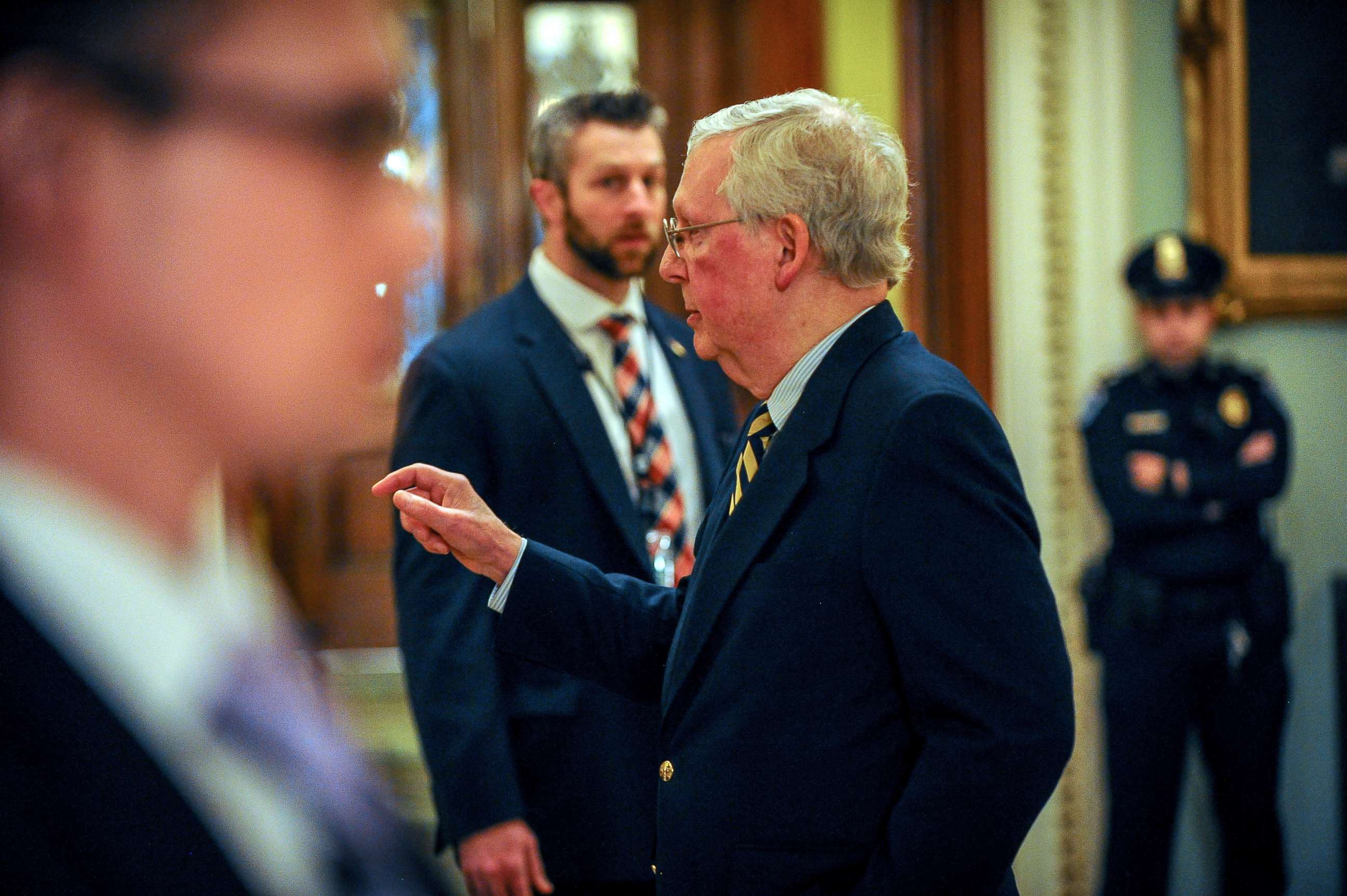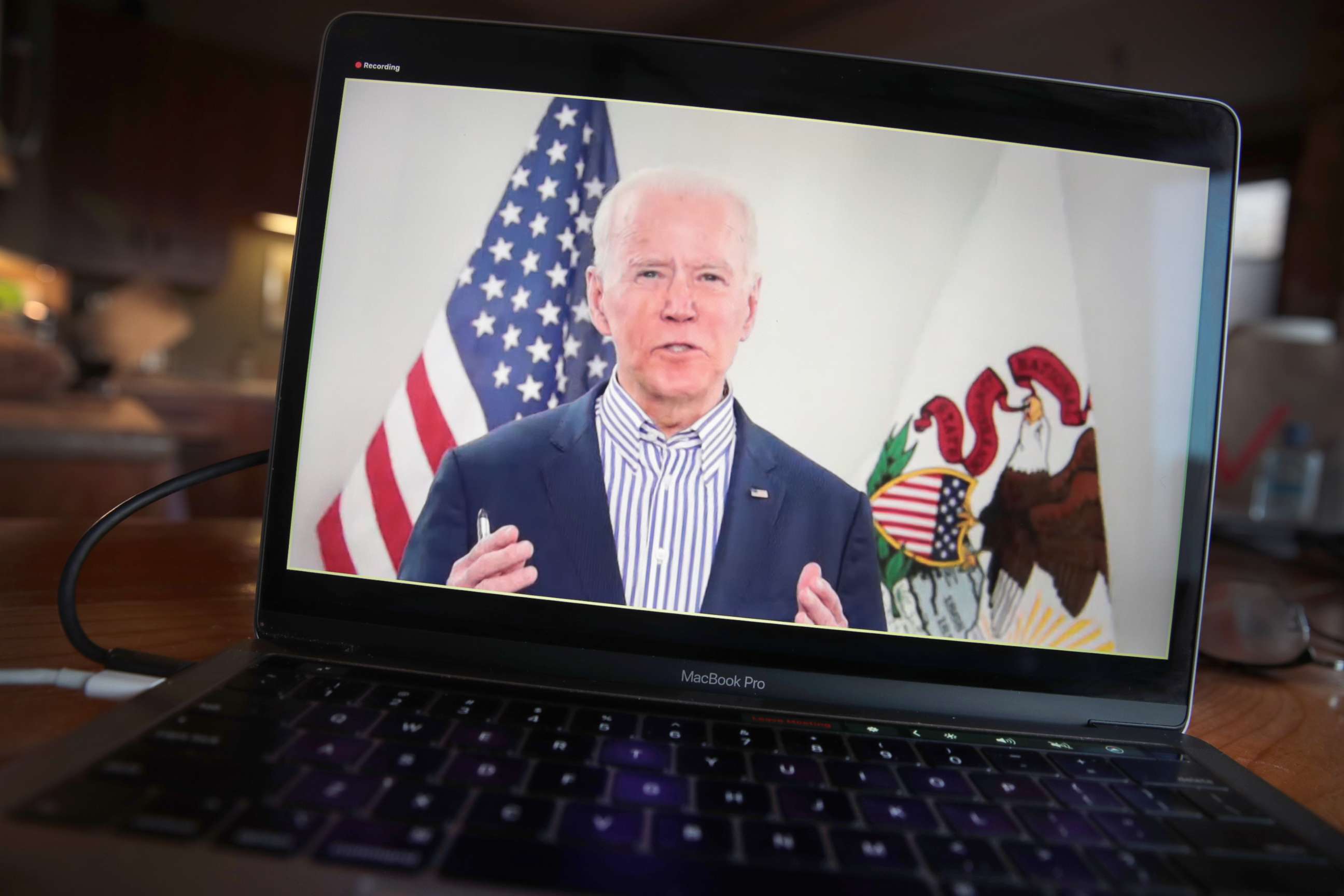The Note: Congress hits partisan snags as diagnoses bring fresh urgency
Senate action on a much-awaited third COVID-19 stimulus package is stalled.
The TAKE with Rick Klein
No, coronavirus did not and will not kill off partisanship on Capitol Hill.
Even that reality has new urgency this week. Senate action on a much-awaited third COVID-19 stimulus package is stalled, with a growing number of congressional diagnoses and self-quarantines that will only make voting less practical as the week goes on.
Families wake up and markets open Monday with the grim reality that now a senator as well as two House members are confirmed coronavirus patients. Add in those who are staying away from work and Senate Republican Leader Mitch McConnell’s majority is a slim 48-47, and Democrats voted in unison to block McConnell’s bill from coming for a vote late Sunday.
Democratic House leaders and leading Democratic senators are on record saying McConnell’s latest proposal -- authored exclusively by Republicans -- needs to address broader priorities. Senate Democratic leader Chuck Schumer blasted it for including “a large corporate bailout provision, with no protections for workers and virtually no oversight.”

The lingering presidential primary could have an impact as well. Sen. Bernie Sanders is promising to lead progressive fights in Washington against what he’s calling “corporate welfare,” and former Vice President Joe Biden will to start going on camera Monday to respond to coronavirus developments, after six days where he hasn’t appeared on television.
“We all want to get to the same place,” President Donald Trump said Sunday night -- holding his partisan fire on this front for the moment.
The sense of unease over this moment is only exacerbated by the human element, as Sen. Rand Paul’s time in gym on Sunday -- as he awaited a diagnosis -- made clear.
It appears that lawmakers themselves have not been heeding warnings about self-isolating and social distancing. That only adds to the uncertainty over Washington’s ability to act and react.
The RUNDOWN with MaryAlice Parks
The coronavirus crisis continues to put the country’s federalism model to the test and the Republican Party’s view of that system, which tends to skew toward states’ rights and leadership, under a tough microscope.
“It is extremely important that the American people recognize that one of the things that makes America different is that we have a system of federalism,” Vice President Mike Pence said Sunday night. He talked about the work being done by FEMA as an example of his larger thinking on the fight against this virus: “It is locally executed, state managed, and federally supported.”
But President Trump has likened this moment to the country being at war and wartime is exactly when citizens expect the federal government to take charge.
Speaking to ABC’s Martha Raddatz Sunday morning, Gretchen Whitmer, D-Michigan, said, “It would be nice to have a national strategy.”
To date, several governors have pleaded with the federal government for monetary help as well as physical supplies. Whitmer and Governor Phil Murphy, D-NJ, for example, have asked the federal government to dip into federal stockpiles of protective gear for medical professional.
By Sunday evening, administration officials said they were sending masks and other necessities, but that was days after President Trump had told governors to try to buy their own equipment too.
Could fifty competing purchase orders have muddled the supply chain? Probably so.
A virus will not recognize state borders and the actions, or lack thereof, in one state could greatly impact neighboring residents. More, even the best-run states will look to the federal government for the big tasks like developing new medicine, working with industry to streamline products, and deploying massive resources.
Washington Governor Jay Inslee Sunday night said he was very disappointed the USNS Mercy, a hospital ship, was being dispatched to Los Angeles instead of Seattle -- another reminder of the unique scope of the federal government's reach and power. Only the president can deploy the military.
Clearly the arguments between Washington and the states are only ramping up. Debates about how much help to send from the nation’s capital, and how quickly, will continue in the days and weeks to come -- or states will start to feel like they are in this fight on their own.
The TIP with Molly Nagle and John Verhovek
Former Vice President Joe Biden’s campaign is looking to start off the week by doing something he has been largely unable to do since the coronavirus crisis began: speak directly to reporters and the American public on camera.
“They put in a new high-speed line into my home, they've converted a recreation room, basically, into a television studio. And so beginning tomorrow, I guess tomorrow, I'm making the first presentation at 11:30 a.m. thereabouts, EST,” Biden said during a virtual fundraiser Sunday night.
The campaign advised that Biden will deliver remarks on combating coronavirus Monday, but when asked if the remarks would be on camera as the vice president indicated, they declined to provide specifics about the event.

Technical difficulties derailed the campaign’s first attempt at a virtual event, highlighting the Biden team’s digital infrastructure deficit compared to Sanders, who has held several events on camera over the last week.
Biden told reporters on a call late last week that his campaign was “desperately” working to build up the infrastructure needed to allow him to address the public on a regular basis. Monday’s event could serve as a test for the campaign and their ability to adapt to the new virtual world in which the 2020 race exists -- at least for the foreseeable future.
THE PLAYLIST
ABC News' "Start Here" Podcast. Monday morning’s episode features ABC News’ Trevor Ault, who walks us through the latest on the ‘Phase 3’ coronavirus stimulus bill. Then, ABC News’ Anne Flaherty explains why many states are still dissatisfied with the federal government’s response to the outbreak. And, South Shore Health Director of Infectious Diseases Dr. Todd Ellerin gives us a user guide for personal gloves and masks. http://apple.co/2HPocUL
WHAT YOU NEED TO KNOW TODAY
Download the ABC News app and select "The Note" as an item of interest to receive the day's sharpest political analysis every weekday.
The Note is a daily ABC News feature that highlights the key political moments of the day ahead. Please check back tomorrow for the latest.






